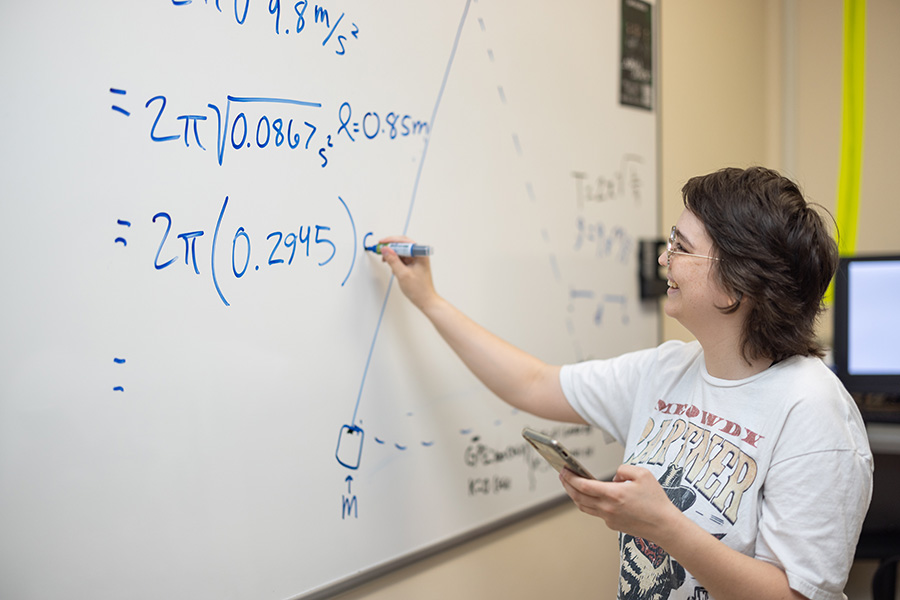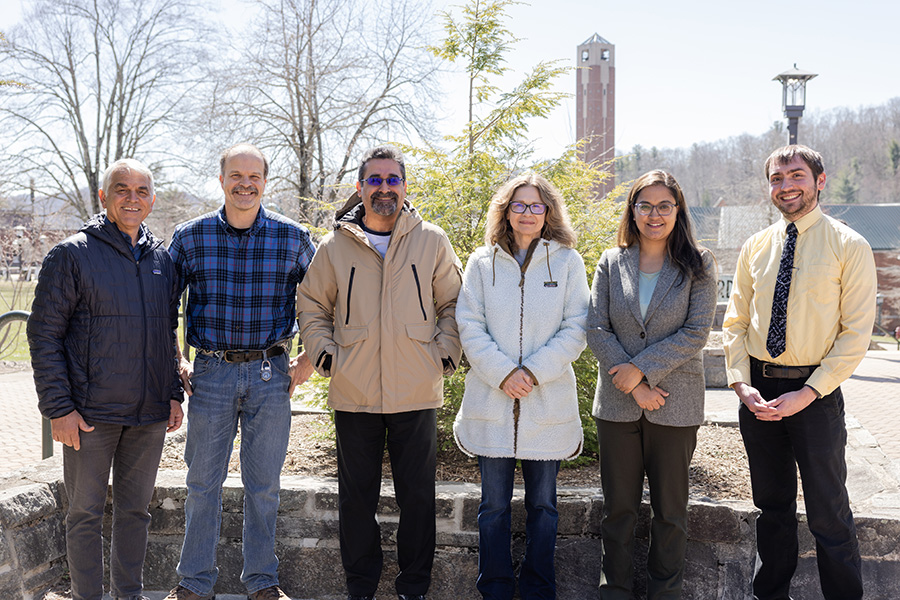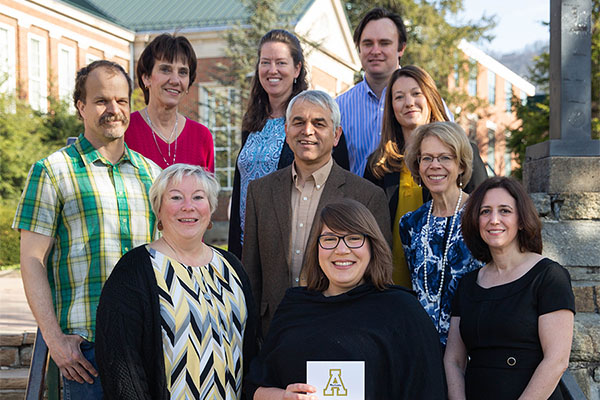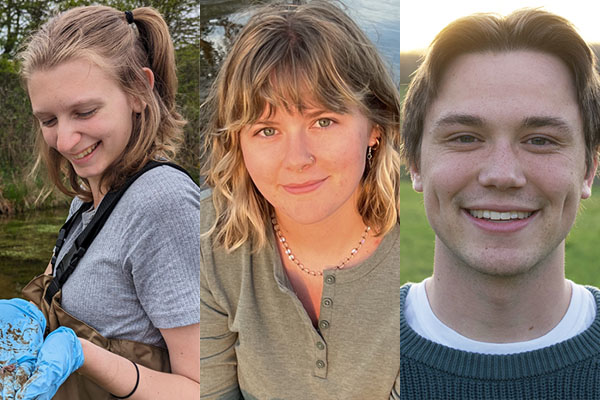
App State senior Lex Foote, a Scholarships in STEM (S-STEM) Scholar in math from Linville, demonstrates an equation on the whiteboard. A new $2 million award from the National Science Foundation’s S-STEM Program will provide up to $8,500 in scholarship funding per year for more than 50 App State undergraduate and graduate students focused on chemistry, computer science, geology, math and physics. Photo by Chase Reynolds
BOONE, N.C. — A nearly $2 million grant awarded to Appalachian State University by the National Science Foundation (NSF) will help put educational goals within reach for more than 50 Mountaineer students pursuing degrees in STEM (science, technology, engineering and math).
Awarded through NSF’s Scholarships in STEM (S-STEM) Program, the six-year grant supports The Appalachian High Achievers in STEM II program and will provide up to $8,500 in scholarship funding per year — for up to four years — to App State undergraduate and graduate students focused on chemistry, computer science, geology, math and physics.
In addition to financial support, S-STEM students will receive mentoring from faculty and student peers. Students will work alongside faculty to develop and apply data science skills to solve research problems.
Students are selected based on demonstrated academic ability and financial need, an essay and references, among other criteria. Scholarship funding is available to incoming first-year, transfer and graduate students, as well as current juniors and seniors who are committed to pursuing graduate studies in STEM.
“The S-STEM program helps academically talented students with high financial need from the College of Arts and Sciences build a strong, supportive community,” said Dr. Rahman Tashakkori, who spearheads the scholarship program at App State and is the Lowe’s Distinguished Professor of Computer Science in the Department of Computer Science.
“The majority of our S-STEM students are first-generation students who can benefit from the faculty mentors and peer role models in this program,” added Tashakkori, who noted that participation in undergraduate research — a key focus at App State — has been proven to increase student retention.
The Appalachian High Achievers in STEM II program, which will operate through 2031, builds upon the previous iteration of the program that ran from 2018 to 2022 and was also supported by NSF funding. The previous program had a more than 88% retention rate, as measured from the time the students were admitted into the program to their graduation from App State.
The program’s faculty leaders will serve as points of contact for S-STEM Scholars and evaluate the program as it progresses, with a goal of determining what types of support are most beneficial to the scholars. Leaders will also survey student participants to measure the impact of specific activities on their sense of community, academic self-confidence and success in their STEM majors.
Program activities designed to strengthen student success include summer research; flexible, team-based study halls; weekly seminars that include Data Science Series Talks led by Tashakkori, guest speakers and resilience and well-being workshops; community service opportunities to benefit both the university and the local community; networking with program alumni; and leadership training.

Pictured on App State’s Boone campus are the faculty leaders of The Appalachian High Achievers in STEM II program, which is funded by a nearly $2 million, six-year grant through the National Science Foundation’s Scholarships in STEM (S-STEM) program. From left to right: Dr. Rahman Tashakkori, Dr. Andrew Heckert, Dr. Mohammad Ali Javidian, Dr. Carol Babyak, Dr. Roshani Silwal and Dr. Jacob Blazejewski. Not pictured is Dr. Cindy Norris. All members of this cross-disciplinary team teach in App State’s College of Arts and Sciences. Photo by Chase Reynolds
Preparing STEM students for success — in and beyond the classroom
App State’s S-STEM initiative aims to prepare students for careers in STEM, which, according to the U.S. Bureau of Labor Statistics, are projected to grow by 10.4% over the next decade — significantly outpacing the 4% growth rate for all occupations. Several Mountaineers, both former and current S-STEM Scholars, shared stories highlighting the program’s value.
For senior geology major and current S-STEM Scholar Gabriel Wheaton, of Roanoke, Virginia, the chance to present his research findings are elevating his App State Experience, he shared. Wheaton, who is currently mentored by Dr. Sarah Carmichael, professor in the Department of Geological and Environmental Sciences (GES), presented findings on persistent organic pollutants at the 2023 Sea to Summit Symposium and is now analyzing specimens from the Central Asian Orogenic Belt to better understand ancient extinction dynamics as an undergraduate research assistant in the GES Department.
“My dreams are to apply myself to a graduate program and gain the research experience necessary to engineer innovative solutions for a cleaner, more sustainable energy solution in the United States,” he said.
Engineering physics graduate student Sydney Andrews ’24, who received S-STEM scholarships during her undergraduate studies at App State, shared that the financial support she received through the program made it possible for her to graduate without the burden of student loan debt.
“I grew up poor and didn’t have any money set aside for college,” said Andrews, of Rocky Point. “The funding I received from S-STEM allowed me to go through undergrad without taking out any loans, and I was able to only have part-time jobs instead of needing a full-time job.”
She added, “The study halls are great for getting help with homework and talking to other people you may not get to meet in other STEM majors.”
A grounding in undergraduate research at App State, made possible by S-STEM scholarship support, gave App State alumna Dr. Ashley Roberts ’09 ’12 critical tools for designing research projects and presenting results — skills she took with her to study at a renowned microscopy facility in Denmark and complete three NC Space Grant projects.
“The approach used in the S-STEM Program — where cross-disciplinary teams work together on a defined research problem — was novel at that time but now forms an essential approach to all areas of research today,” said Roberts, who is a senior technical leader at Electric Power Research Institute, a leading global nonprofit focused on renewable energy research and development.
“Today, I encourage application of the S-STEM model to build effective teams and incorporate design thinking to address pressing challenges in the energy sector while working with industry, academia and the public,” Roberts said.
S-STEM leaders at App State
The following faculty in the College of Arts and Sciences serve as leaders of the NSF-supported Appalachian High Achievers in STEM II program:
- Dr. Carol Babyak, associate professor and research mentor, Department of Chemistry and Fermentation Sciences
- Dr. Jacob Blazejewski, assistant professor, Department of Mathematical Sciences
- Dr. Andrew Heckert, professor, Department of Geological and Environmental Sciences
- Dr. Mohammad Ali Javidian, assistant professor, Department of Computer Science
- Dr. Cindy Norris, professor, Department of Computer Science
- Dr. Roshani Silwal, assistant professor, Department of Physics and Astronomy
- Dr. Rahman Tashakkori, professor, Department of Computer Science
What do you think?
Share your feedback on this story.
About the College of Arts and Sciences
The College of Arts and Sciences (CAS) at Appalachian State University is home to 17 academic departments, two centers and one residential college. These units span the humanities and the social, mathematical and natural sciences. CAS aims to develop a distinctive identity built upon our university's strengths, traditions and locations. The college’s values lie not only in service to the university and local community, but through inspiring, training, educating and sustaining the development of its students as global citizens. More than 6,800 student majors are enrolled in the college. As the college is also largely responsible for implementing App State’s general education curriculum, it is heavily involved in the education of all students at the university, including those pursuing majors in other colleges. Learn more at https://cas.appstate.edu.
About Appalachian State University
As a premier public institution, Appalachian State University prepares students to lead purposeful lives. App State is one of 17 campuses in the University of North Carolina System, with a national reputation for innovative teaching and opening access to a high-quality, cost-effective education. The university enrolls more than 21,000 students, has a low student-to-faculty ratio and offers more than 150 undergraduate and 80 graduate majors at its Boone and Hickory campuses and through App State Online. Learn more at https://www.appstate.edu.













